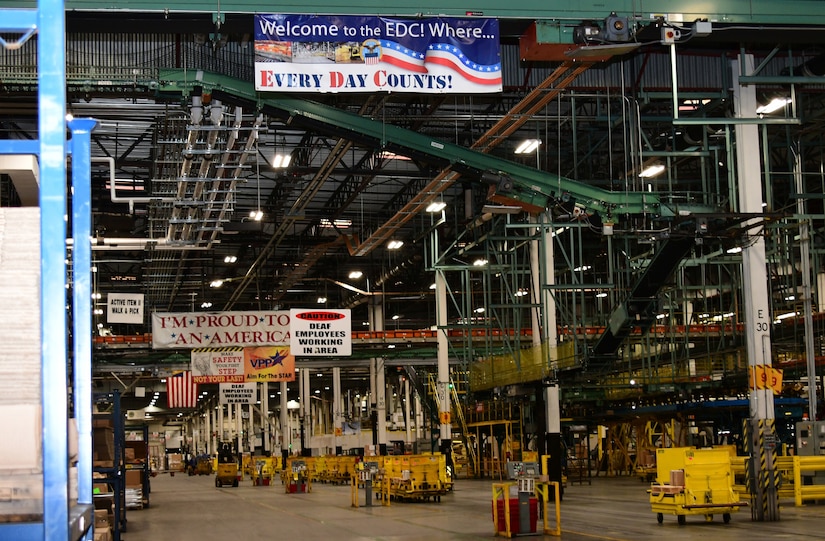May 1, 2020 | BY Chris Erbe
The agency that traditionally contributes to America's
military readiness with items such as fuel and food has so far ordered more than
$920 million in lifesaving supplies and equipment to support the nation's
COVID-19 response.
Time-tested processes and partnerships developed during past
humanitarian assistance operations enable the Defense Logistics Agency to
provide supplies and services that few organizations, public or private, can
match, said DLA Director Army Lt. Gen. Darrell K. Williams.
"While DLA is a combat logistics support agency whose
mission is to support our military services and combatant commands, its support
to the whole of government during times of national crisis is
indispensable," he said. It manages about $42 billion in annual sales for
the military services, 11 combatant commands and 42 federal agencies, as well
as partner and allied nations.
DLA has supported the Defense Department's COVID-19 response
by increasing production and acquisition of critical items through existing
large-scale contracts across multiple supply chains.
"Our outreach to industry has been ongoing for years
with strategic supplier alliances, prime vendor relationships and other
tailored logistics vehicles," said Tim Stark, DLA ombudsman. "These
partnership-type connections allow us the flexibility to respond rapidly during
times of stress on the industrial base like we're seeing today."
By late April, the agency had procured more than 4 million
N95 respirator masks, 14.4 million nonmedical and surgical masks, 92.2 million
exam gloves, 816,300 hand sanitizers, 821,000 test components, 8,000
ventilators, and 2.5 million isolation and surgical gowns for military and
federal agencies.
DLA also stocked the Navy hospital ships USNS Comfort and
USNS Mercy with more than $14 million in protective equipment, pharmaceuticals,
medical supplies, fuel, food and repair parts. Other military medical support
went to Army field hospitals in places such as the alternate care facility at
the Jacob J. Javits Convention Center in New York City. Respirators and other
medical equipment have been used aboard the USS Ronald Reagan, USS Nimitz and
USS Theodore Roosevelt. Gloves, masks and hand sanitizers were sent to troops
in South Korea.
Specialized items such as COVID-19 test kits, patient
monitors and nonmedical fabric face masks were also researched and introduced
into DLA's inventory. And to address critical supply shortages early, DLA
broadened its manufacturing base to acquire medical supplies through global and
domestic sources.
Using additive manufacturing technology, DLA procured 11,000
laser-cut protective face shields for New York City medical workers. The agency
also met N95 mask shortages by awarding a contract to provide the Federal
Emergency Management Agency and the Department of Health and Human Services
with 60 Critical Care Decontamination
Systems, each capable of sanitizing 80,000 masks a day for reuse.
Even items previously scheduled for disposal or reuse have
been provided, with DLA Disposition Services sending thousands of respirators,
surgical masks, gowns, gloves, goggles and other items to military and federal
customers.
Luis Guzman, area manager for DLA Disposition Services at
Camp Pendleton, California, said his team has provided temporary hospitals throughout
the country with everything from tents and cots to mattresses, exam tables and
diagnostic lighting.
"Our personnel here are doing everything within their
power to identify property that can support this COVID-19 pandemic
response," he said.
The agency can also deploy expeditionary logistics
capabilities around the globe at a moment's notice.
"DLA is a consequential partner in supporting the
whole-of-nation response," said Air Force Maj. Gen. Allan Day, director of
DLA Logistics Operations. "And while we recognize that COVID is the enemy
here, we're not losing sight of our mission to provide readiness support for
all of the services."
Though DLA is a DOD agency, support to other federal
agencies is a priority that comes to the fore during crisis response such as
COVID-19. The partnership involves federal, state, local and tribal entities,
said Stephen Dubernas, chief of DLA's Whole of Government Division.
"In fact, through the State Department and the U.S.
Agency for International Development, we're integrating with many foreign
countries, so I would call it a 'whole-of-globe' response."
Dubernas said the agency's focus pivots to support the
nation when needed. "Never has this been more important than the response
to COVID-19," he said. "On a daily basis, we're touching a large
number of our more than 40 interagency partners."
DLA has provided logistics support for 26 disaster relief
and humanitarian assistance responses since 2010, including hurricanes Harvey,
Irma and Maria in 2017, and Florence and Michael in 2018. The agency also
played a major role in response to the 2014 Ebola outbreak in Liberia. Those
events gave agency employees real-world experience consolidating support with
government agencies such as FEMA, thef State Department and the Army Corps of
Engineers.
To support the current crisis, DLA liaisons are embedded
with FEMA, HHS, the White House Task Force, U.S. Northern Command and the
Pentagon's Joint Acquisition Task Force.
"I think in many ways DLA was put together for such a
time as this," Day said. "We're what the nation needs right now, and
I'm really proud of the people who are making it happen."
Williams added that DLA is solidifying its role as an
invaluable asset for DOD and the federal government by showing its unique
ability to leverage logistics expertise for humanitarian response while
maintaining warfighter support.
"I've always been proud of DLA's support to our
warfighters and our nation," he added. "Our people remain the secret
sauce of this agency – they're the ones who make all of this support
possible."









No comments:
Post a Comment